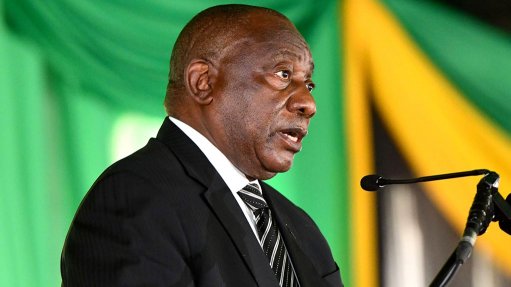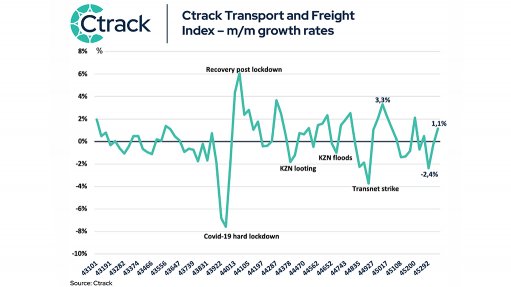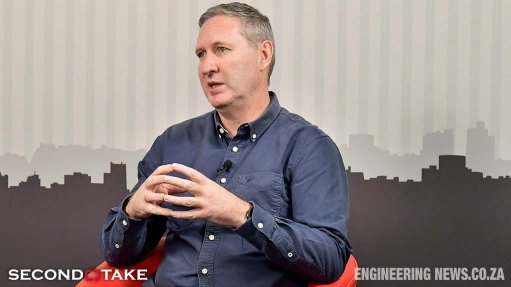Tender cancellations, lack of projects contribute to lower construction sector confidence
Confidence expressed by businesses in the construction sector fell to 42 in the second quarter, industry organisation Consulting Engineers South Africa's (Cesa's) Bi-annual Economic and Capacity Survey (BECS) shows.
The lower confidence is owing to a more negative economic outlook in view of increased loadshedding and higher interest rates.
Confidence in the civil sector fell sharply in the first half of this year, as construction activity in the civil industry remains constraint by lack of government projects, while the higher rate of postponements is diminishing growth potential expected by the uptick in tendering activity in the second half of 2021.
The results of the survey indicate an improved outlook for this year, but projections remain below 2% for 2023/24 on the back of higher lending rates dampening potential investment demand and slower consumer demand, Cesa says.
Further, pressure remains on government to increase investment in infrastructure, up the pace of tender awards, reduce the number of tender cancellations and put measures in place to arrest the increasing emigration of the country’s technical expertise and skills.
On average, all firm size categories reported a higher percentage of tender cancellations. Difficulties within the public sector associated with project management, planning and implementation are well known, resulting in an increased tendency of project cancellations, particularly within local government. This is concerning, as local governments have over the past few years been allocated larger shares of the infrastructure budget, says Cesa CEO Chris Campbell.
The lack of investment in infrastructure development, particularly from the public sector, coupled with the lack of government projects, the slow pace at which tenders are awarded and the high percentage of tender cancellations, is very concerning. This is devastating the sustainability of companies in the consulting engineering and construction sector, Cesa points out.
It adds that the industry is experiencing an increase in the loss of technical skills through emigration.
South Africa continues to experience inflationary pressures, a weak public fiscus and higher lending rates, and although private sector investment shows some recovery, investment in construction still shows no signs of recovery. Gross domestic product growth is expected to remain at or below 2% for the next three years, Campbell adds.
Further, the outlook for the following six to twelve months is uncertain, with the majority of respondents to the BECS not expecting a major improvement and maintaining satisfaction rates below 50%. Only around a third of the larger firms expect satisfactory conditions in the next 12 months.
The report also revealed that the industry may have reached its lower turning point, considering the pressure on government to not only increase infrastructure expenditure but to include the private sector as a partner. The reality is that, once infrastructure programmes kick off, many of which have been in planning for years, the turnaround in the industry can be swift, he highlights.
“It is a well-known fact that infrastructure development underpins economic growth, and we are appealing to government to stop talking and to start implementing infrastructure projects,” he says.
FALLING INVESTMENT
Investment in construction plunged to below R250-billion - in annualised, 2015 prices - in 2021, from a peak of R384-billion in 2016. Apart from a correction in 2020, investment mostly contracted on a quarter-on-quarter basis for the past 34 quarters, since 2014.
Investment in construction works is currently at 52% of its peak in 2013, and down to R114-billion in the first quarter of 2022. Investment in residential buildings dropped to R84-billion in the first quarter, compared to 62% at its peak in 2007, while investment in non-residential buildings declined to R31.6-billion, compared to 36% at its peak in 2008.
“Credit rating agency Moody's has highlighted the dire consequence of lack of investment in water and electricity and noted that capital expenditure in most of the municipalities rated by Moody’s is below the 10% to 20% of total spending as recommended by Treasury to ensure infrastructure needs are addressed,” Campbell emphasised.
Further, government investment continues to decline, with gross fixed capital formation (GFCF) boosted by private sector investment. Higher levels of investment by the private sector boosted overall GFCF by 3.7%. Investment by government declined by 4.2%, which is the fourth consecutive quarter, and State-owned enterprise investment levels also weakening by 1%.
Meanwhile, public sector investment, which includes government and State-owned enterprises, as a percentage of gross domestic product (GDP) declined to 4% in the first quarter of 2022 from an average of 6.5% between 2007 and 2015. The public sector failed dismally against the National Development Plan target of 10% of GDP.
“The strongest decline is seen in investment by State-owned enterprises, which is down from R140-billion a year to R68-billion. Investment by government slowed from R170-billion to R110-billion in the fourth quarter of 2021, albeit with an improved performance in the second quarter of this year, when it rose to R114-billion.”
Further, fees outstanding continue to be an issue while, on a positive note, companies reported that their order book to income ratio increased to the highest level since December 2018, Cesa says in the survey report.
The satisfaction rate related to fee income among firms improved to 83.6% in the current survey from 77.3% in the previous survey and 80.2% in the first six months of 2021, which is well above the five-year average prior to Covid-19 when it was around 47%. Discounting continues to be an issue while competition remains fierce, Cesa adds.
Comments
Press Office
Announcements
What's On
Subscribe to improve your user experience...
Option 1 (equivalent of R125 a month):
Receive a weekly copy of Creamer Media's Engineering News & Mining Weekly magazine
(print copy for those in South Africa and e-magazine for those outside of South Africa)
Receive daily email newsletters
Access to full search results
Access archive of magazine back copies
Access to Projects in Progress
Access to ONE Research Report of your choice in PDF format
Option 2 (equivalent of R375 a month):
All benefits from Option 1
PLUS
Access to Creamer Media's Research Channel Africa for ALL Research Reports, in PDF format, on various industrial and mining sectors
including Electricity; Water; Energy Transition; Hydrogen; Roads, Rail and Ports; Coal; Gold; Platinum; Battery Metals; etc.
Already a subscriber?
Forgotten your password?
Receive weekly copy of Creamer Media's Engineering News & Mining Weekly magazine (print copy for those in South Africa and e-magazine for those outside of South Africa)
➕
Recieve daily email newsletters
➕
Access to full search results
➕
Access archive of magazine back copies
➕
Access to Projects in Progress
➕
Access to ONE Research Report of your choice in PDF format
RESEARCH CHANNEL AFRICA
R4500 (equivalent of R375 a month)
SUBSCRIBEAll benefits from Option 1
➕
Access to Creamer Media's Research Channel Africa for ALL Research Reports on various industrial and mining sectors, in PDF format, including on:
Electricity
➕
Water
➕
Energy Transition
➕
Hydrogen
➕
Roads, Rail and Ports
➕
Coal
➕
Gold
➕
Platinum
➕
Battery Metals
➕
etc.
Receive all benefits from Option 1 or Option 2 delivered to numerous people at your company
➕
Multiple User names and Passwords for simultaneous log-ins
➕
Intranet integration access to all in your organisation


















